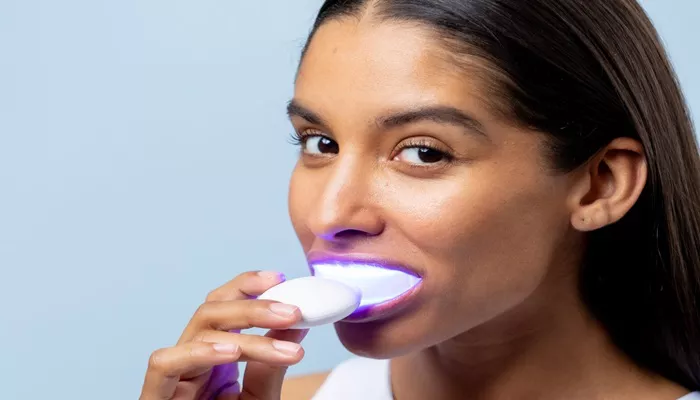Teeth whitening has become a popular cosmetic dental procedure, offering individuals the chance to achieve a brighter, more confident smile. However, many users may not be aware of the potential side effects associated with these products, one of which is blistering. This article will explore the eight main reasons why teeth whiteners can cause blistering, providing a detailed overview to help users understand the risks involved.
The 8 Top Reasons Why Teeth Whitener Bubbles
1. Chemical Composition of Whitening Agents
The primary agents used in teeth whitening products are bleaching agents, such as hydrogen peroxide and carbamide peroxide.
Hydrogen Peroxide: This is a potent bleaching agent that can penetrate the enamel and dentin of the teeth. While effective at removing stains, it can also irritate soft tissues in the mouth, leading to blistering. When used in high concentrations, hydrogen peroxide can cause chemical burns to the gums and oral mucosa.
Carbamide Peroxide: This compound breaks down into hydrogen peroxide when applied. Although it is generally considered safer, it can still cause similar reactions if left on the teeth or gums for too long.
The concentration of these chemicals in over-the-counter products can vary significantly, increasing the risk of irritation and blistering, especially for individuals with sensitive gums or pre-existing dental issues.
see also: How Long Should You Use A Teeth Whitening Light
2. Improper Application Techniques
Many users of teeth whitening products do not follow the instructions provided, leading to improper application.
Excessive Product Use: Applying more product than recommended can increase the likelihood of the whitening agent coming into contact with the gums, resulting in irritation and blistering.
Extended Contact Time: Leaving the whitening agent on for longer than recommended can exacerbate its effects, increasing the risk of chemical burns.
Inadequate Tray Fit: For whitening trays that are not custom-fitted, the product may leak onto the gums, leading to irritation and blistering.
Proper adherence to application instructions is crucial to minimize the risk of adverse effects.
3. Pre-existing Oral Conditions
Individuals with certain oral health conditions are at a higher risk of experiencing blistering from teeth whiteners.
Gum Disease: Those suffering from gingivitis or periodontitis may have inflamed gums, making them more susceptible to irritation from whitening agents.
Sensitive Gums: Individuals with naturally sensitive gums may react more severely to the chemicals in whitening products, leading to blistering.
Oral Lesions: Any existing cuts, sores, or lesions in the mouth can exacerbate the effects of whitening agents, leading to increased irritation and blistering.
Consulting with a dental professional before starting any whitening treatment is essential for individuals with these conditions.
4. Duration and Frequency of Use
The duration and frequency with which individuals use teeth whiteners can significantly impact the likelihood of blistering.
Overuse: Using whitening products too frequently can lead to cumulative damage to the gums and soft tissues in the mouth. This can result in chronic irritation and blistering.
Long Sessions: Extended whitening sessions, especially those that exceed the recommended time, can lead to severe irritation and blistering due to prolonged exposure to harsh chemicals.
Adhering to recommended usage guidelines is vital for preventing blistering and other side effects.
5. Temperature Sensitivity
The temperature of the whitening product can also play a role in causing blistering.
Cold Products: Some individuals may experience sensitivity or irritation when applying cold whitening products, which can cause the gums to react negatively.
Heat Sensitivity: Conversely, applying whitening products that are too warm can also irritate the gums and lead to blistering.
Using products at room temperature can help minimize these risks.
6. Allergic Reactions
Some individuals may have allergic reactions to the ingredients in teeth whitening products.
Chemical Sensitivity: Allergies to hydrogen peroxide or other whitening agents can manifest as blistering or severe irritation in the mouth.
Other Ingredients: Additional components in whitening products, such as flavoring agents or preservatives, can also trigger allergic reactions.
If blistering occurs, it is essential to discontinue use and consult a dental professional to determine if an allergy is present.
7. Inadequate Post-Treatment Care
After using teeth whitening products, inadequate care can lead to increased irritation and blistering.
Ignoring Sensitivity: If users experience gum sensitivity or irritation after treatment, ignoring these symptoms can lead to worsening conditions, including blistering.
Lack of Oral Hygiene: Failing to maintain proper oral hygiene after whitening can allow bacteria to thrive in an irritated environment, exacerbating blistering.
Implementing a good oral care routine post-treatment is crucial for maintaining gum health.
8. Product Quality and Regulation
The quality and regulation of teeth whitening products can vary widely.
Unregulated Products: Many over-the-counter whitening products are not subject to strict regulations, leading to variations in quality and safety. Products with high concentrations of bleaching agents may pose a greater risk of blistering.
Professional Treatments: While professional whitening treatments are generally safer due to oversight by dental professionals, they can still cause blistering if not performed correctly.
Choosing reputable products and consulting with dental professionals can help mitigate risks associated with teeth whitening.
Conclusion
Teeth whitening can enhance your smile and boost your confidence, but it is essential to be aware of the potential risks, including blistering. Understanding the underlying causes can help users make informed decisions and take necessary precautions.

